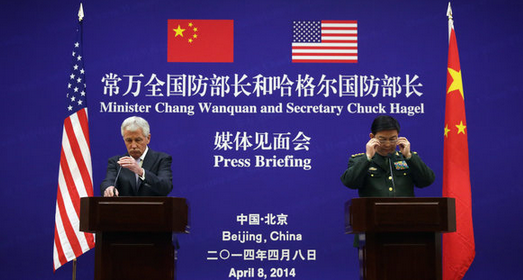
(Photo Credit: Alex Wong)
(BGF) – A recent article in The New York Times, by Helene Cooper, discusses U.S. Defense Secretary Chuck Hagel’s recent visit to Beijing. In particular, Cooper notes that, despite efforts by Secretary Hagel and China’s Defense Minister, General Chang Wanquan, to give the impression of constructive meetings, it was apparent that the U.S. and China remain at odds over China’s territorial disputes in the East China Sea and South China Sea. As Secretary Hagel reiterated during his trip, the U.S. is fully committed to its defense treaties with Japan and the Philippines. However, General Wanquan noted that China would “make no compromise” on the issue of its territorial integrity. Thus, it appears that China’s territorial claims in the East and South China Seas remain a source of tensions between the U.S. and China. Click here to read the full article or visit The New York Times‘ website.
Hagel Spars With Chinese Over Islands and Security
By Helene Cooper
BEIJING — The United States and China clashed over Japan on Tuesday as the Chinese defense minister asserted that Beijing had “indisputable sovereignty” over a group of islands in the East China Sea and that his country’s military stood ready to protect its interests in territorial disputes.
The minister, Gen. Chang Wanquan, said that China would not be first to launch an attack over the territorial dispute. But he accused Japan of “confusing the right with the wrong” in its assertion of control over the disputed islands in the East China Sea, which are known as the Senkaku in Japan and as the Diaoyu in China.
“China has indisputable sovereignty over the Diaoyu Islands,” General Chang said. He added that on the issue of what he called “territorial sovereignty,” China would “make no compromise, no concession, no treaty.”
He continued, “The Chinese military can assemble as soon as summoned, fight any battle and win.”
General Chang made his comments at a news conference with the United States defense secretary, Chuck Hagel, after a morning of meetings at the Ministry of National Defense. It is Mr. Hagel’s first trip to China as defense secretary.
While both men sought to present their meetings as constructive, they espoused divergent views on a number of issues, particularly the territorial dispute in the East China Sea, and a similar dispute between China and the Philippines in the South China Sea.
At one point, Mr. Hagel appeared impatient, wagging his finger. “The Philippines and Japan are longtime allies of the United States,” he said. “We have mutual self-defense treaties with each of those countries,” he continued, adding that the United States was “fully committed to those treaty obligations.”
Mr. Hagel accused China of adding to tensions in the region by declaring an air defense zone in the East China Sea with “no collaboration, no consultation.” Such moves, he warned, could “eventually get to dangerous conflict.”
The exchange punctuated a visit that American defense officials had sought to present as a long-awaited deepening of military relations between the countries. On Monday, Mr. Hagel became the first foreign dignitary allowed on board a Chinese aircraft carrier, and on Tuesday the United States and China announced modest steps toward improving communications.
But there appeared to be no closing of the gaps on more contentious issues.
Mr. Hagel, for instance, called on China to be more open about its cyberwarfare capabilities, which American officials have said Beijing uses for commercial espionage.
Mr. Hagel portrayed the United States as transparent about its own capabilities in telecommunications security, pointing to a recent briefing that the Defense Department gave to Chinese officials on the Pentagon’s doctrine for defending against cyberattacks. “More transparency will strengthen China-U.S. relations,” he said. “Greater openness about cyber reduces the risk that misunderstanding and misperception could lead to miscalculation.”
Beijing, American defense officials said, still has not responded to Mr. Hagel’s invitation to reciprocate with a briefing of its own.
Click here to read the full article.